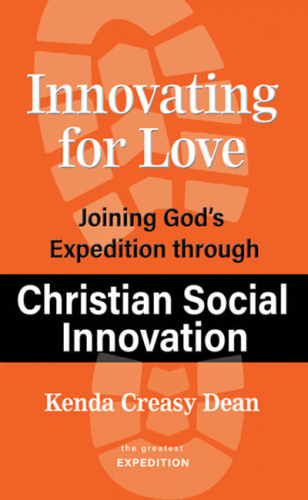Dr. Kenda Creasy Dean is the guest on the most recent edition of the Presbyterian Foundation’s ‘Leading Theologically’
by Mike Ferguson | Presbyterian News Service

Dr. Kenda Creasy Dean
LOUISVILLE — The most important thing in Christianity isn’t what, but who.
That’s the lesson Princeton Theological Seminary’s Dr. Kenda Creasy Dean learned from her advisor, Dr. Robin Maas, while attending Wesley Theological Seminary. “That was a radical thought for me,” Dean told the Rev. Dr. Lee Hinson-Hasty Wednesday during the Leading Theologically broadcast for the Presbyterian Foundation, which can be seen here or here. “I came from a long line of people in youth ministry who thought every week, what am I going to do? Wrong question! It was the genesis of this work [her 2022 book “Innovating for Love: Joining God’s Expedition Through Christian Social Innovation”]. On my best days, I hope I channel her.”
Dean, the Mary D. Synnott Professor of Youth, Church and Culture at Princeton Seminary, said that while she’s not thrilled to have “innovating” in her book title, “there is something to be said” for the fact that the root word in Latin is novum, “a new thing,” and “God talks about doing a new thing.”
“It’s not about dusting off or tweaking,” Dean said. “God goes for it. God does a radical new thing,” such as bringing life from death. “What that means for me is we have to figure out how to rely on God’s innovation rather than ours. We can’t out-innovate God. God invites us to participate in the new thing God is doing, and our best effort is being with people the way God is with us.”
For Dean, “Christian innovation has nothing to do with building a better church or fixing the church. It’s about participating in God’s new thing and bringing life to dead places.”
In the Christian life, “the things that matter are low to the ground, not high in the air,” she said. We walk the way of Christ by undertaking Christian practices, including “being attentive in prayer, reading Scripture seriously and taking time out for sabbath or worship.”
“My hunch is we all have our favorite practices,” Dean said, “but they all get us in the same room.”
“There are a lot of ministries I think of that don’t present themselves as churches, and yet God is being glorified in big ways,” she said. Each year she tries to take a class with the Rev. Richard Joyner in North Carolina, whom she said “has revived a community in a food desert by farming with children, and it has radically turned the health of the community around.” Indeed, by many accounts growing healthy food has significantly improved the health of Joyner’s rural congregation and the health of 21 others.
“Is that innovative? For a church it is,” Dean said. “For a community to look to its young people to turn their way of living upside down, that feels like a profoundly gospel move to me. Richard cares for this community.”
Then there’s the Try Pie Bakery in downtown Waterloo, Iowa, whose mission is “empowering a diverse group of teen girls in life and leadership skills through meaningful work.” According to Dean, two young women in a Waterloo church were given these marching orders: “We need to do something with girls and solve racism. Go!”
When the women laid out the charge to the girls to whom they ministered, the girls responded, “We should bake pies.” They started a bakery located originally in the church, where they learned life skills including how to be both baker and entrepreneur. On yet another day of the week, the girls attended confirmation classes.

The Rev. Dr. Lee Hinson-Hasty
“Now they have a brick-and-mortar store and a food truck. It’s a big deal in that community,” Dean told Hinson-Hasty. “It came about because a bunch of kids came together and said, ‘Let’s try it.’”
When asked by Hinson-Hasty, “What is church?” Dean said she too asks that question “a lot. It boils down to how much of the church are we willing to let go of in order to follow Jesus. There is plenty we can let go of and not fear that God has let go of us.”
Go here or here to watch past or upcoming episodes of Leading Theologically, hosted twice each month by the Rev. Dr. Lee Hinson-Hasty, senior director for Theological Education Funds Development for the PC(USA)’s Committee on Theological Education and the Presbyterian Foundation.
![]() You may freely reuse and distribute this article in its entirety for non-commercial purposes in any medium. Please include author attribution, photography credits, and a link to the original article. This work is licensed under a Creative Commons Attribution-NonCommercial-NoDeratives 4.0 International License.
You may freely reuse and distribute this article in its entirety for non-commercial purposes in any medium. Please include author attribution, photography credits, and a link to the original article. This work is licensed under a Creative Commons Attribution-NonCommercial-NoDeratives 4.0 International License.
Categories: Presbyterian Foundation, Seminaries
Tags: Committee on Theological Education, dr. kenda creasy dean, innovating for love: joining god's expedition through christian social innovation, leading theologically, presbyterian foundation, Princeton Theological Seminary, rev. dr. lee hinson-hasty, rev. richard joyner, try pie bakery, waterloo iowa
Ministries: Theological Education